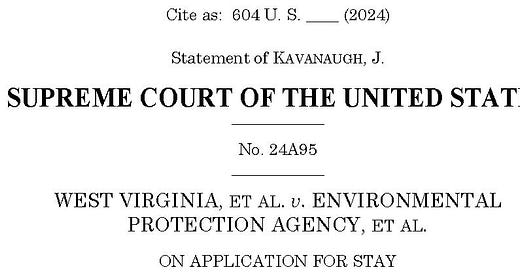Bonus 103: The Power Plant Applications and Irreparable Harm
Justice Kavanaugh's separate opinion in West Virginia v. EPA is exactly right about irreparable harm. The harder question is what it portends for the Court's approach to the equities going forward.
Welcome back to the weekly bonus content for “One First.” Although Monday’s regular newsletter will remain free for as long as I’m able to do this, much of the bonus content is behind a paywall as an added incentive for those who are willing and able to support the work that goes into putting this newsletter together every week. I’m grateful to those of you who are already paid subscribers, and hope that those of you who aren’t will consider a paid subscription if and when your circumstances permit:
Today’s bonus post focuses on yesterday’s ruling in West Virginia v. EPA—in which the Court, 82 days after they were first filed, finally denied eight emergency applications seeking to block the EPA’s new power-plant emissions rules. There’s not a lot in the ruling that explains the delay; Justice Thomas publicly noted his dissent (but didn’t explain it); Justice Alito noted his recusal (albeit not the reasons why); and the only writing came in a one-paragraph “statement” respecting the denial filed by Justice Kavanaugh, and joined by Justice Gorsuch:
In my view, the applicants have shown a strong likelihood of success on the merits as to at least some of their challenges to the Environmental Protection Agency’s rule. But because the applicants need not start compliance work until June 2025, they are unlikely to suffer irreparable harm before the Court of Appeals for the D. C. Circuit decides the merits. So this Court understandably denies the stay applications for now. Given that the D. C. Circuit is proceeding with dispatch, it should resolve the case in its current term. After the D. C. Circuit decides the case, the nonprevailing parties could, if circumstances warrant, seek appropriate relief in this Court pending this Court’s disposition of any petition for certiorari, and if certiorari is granted, the ultimate disposition of the case.
As I explain below the fold, this seems exactly right on the law—and a useful reminder, from two justices whose votes matter a lot in this context, that irreparable harm is a meaningful prerequisite for emergency relief. The problem is that it also seems inconsistent with what both Justices Kavanaugh and Gorsuch wrote as recently as April—and with a majority opinion Justice Gorsuch wrote and Justice Kavanaugh joined in June. And so once again, we’re left with an emergency docket puzzle—whether the Court really has changed the standard for irreparable harm, or it hasn’t. Yesterday’s ruling is an encouraging sign toward the latter, but it’s hard to be confident that it’s heralding a more general return to the conventional understanding.
For those who are not paid subscribers, the next free installment of the newsletter will drop on Monday morning. For those who are, please read on.
Keep reading with a 7-day free trial
Subscribe to One First to keep reading this post and get 7 days of free access to the full post archives.




